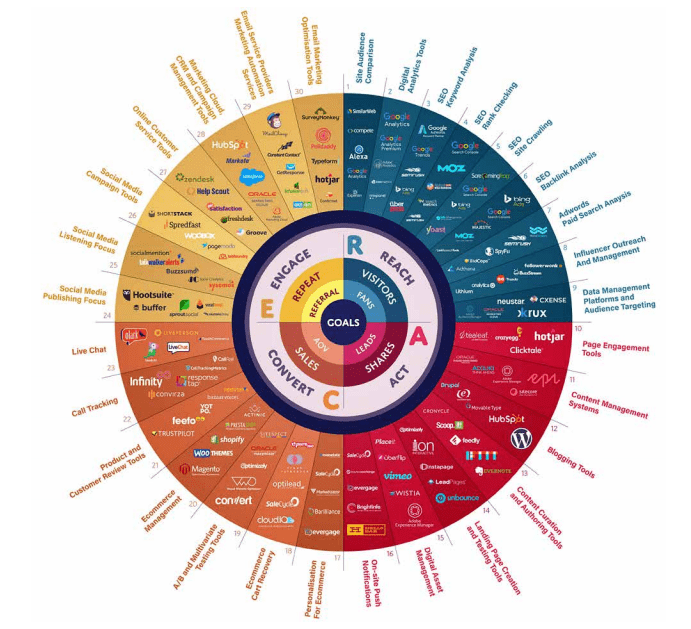Martech tools aren't just for marketers, sales needs them too
The much-talked about disconnect between sales and marketing departments (and likewise professionals) needs to be put to bed. If you pardon the (intentional!) pun: they always have been, and always will be perfect bed companions. Let’s boil this down: the purpose of your marketing department has always been to drive sales, and connect with and engage customers with your brand.
As such, sales and marketing have always been closely linked. Nevertheless, in many businesses, they are remaining distinctly separate, often operating in silos. This approach is in direct opposition to the way modern business works. Instead, marketing and sales should come together to help join the dots between the target audience and the brand itself.
Modern technology is an integral tool in not just connecting those dots between the brand and prospects or customers, but also between the two departments. Silo-based business models are no longer effective and with the added assistance of marketing technologies, your business can operate more effectively and smoothly with leads generated and sales boosted.
The natural connection between sales and marketing is bridged in part by technology, and in part by the development and growth of the latest discipline in the marketing department: marketing operations. Closed loop in design, marketing operations connects marketing and sales directly through innovative processes and a smart data-driven focus.
Martech (marketing technology) is essential in the development of effective marketing operations and a marketing strategy that benefits the whole business. As martech influencer Scott Brinker says: “Marketing has become a technology-powered discipline, and therefore marketing organizations must infuse technical capabilities into their DNA.” A simple, yet powerful statement all businesses should pay attention to.
Accepting Marketing as Science
Many marketing professionals consider themselves “creatives”. And with good reason, too, as it is an essential element of their role and one that has elevated marketing beyond a general “nice to have”, to having a demonstrable impact on the business. Yet, despite this, it has not managed to always be seen as a strategic imperative by the board and C-Suite.
However, as smart technologies and Big Data continue to shape the way marketing campaigns are formed, it is time to accept marketing is a science. Driven by technology, yet still incorporating the creative insight of your team, marketing has become a scientific art that can be measured, tracked and monitored closely, to ensure the best possible results.
80% of companies now have a chief marketing technologist or equivalent according to the 2015-16 Gartner’s CMO Spend Survey. This further corroborates the point that marketing technology is here to stay, and that it goes beyond being a supportive addition to the marketing mix. As it enables the driving of sales, improvement of efficiencies, and generation of tangible business ROI, marketing is now able to be positioned as having a strategic imperative that directly helps accelerate the growth of any business.
Of course, martech is about driving leads, boosting sales, and improving customer experiences. But it can also facilitate better internal communications, fusing that gap between marketing and sales departments, and creating more efficient in-house processes. Marketing is a technology-driven field, and so companies looking to grow have to accept this and embrace this.
Forecasting Martech Capital
Let’s get one thing straight, though: marketing technology is a facilitator, not a replacement. Automation of certain elements of your marketing and sales processes can help free up the time and energy of your team for more effective tasks and enhancing customer experiences.
With more chief marketing technologists, it’s clear many companies are open to exploring and experimenting with the role of martech in their business. The Walker Sands study, “State of Marketing Technology 2017”, found that only 2% of respondents had any plans to reduce their martech budget. Furthermore, 70% are committed to increasing it at least ‘slightly’ going forward.
As an investment in technology, your business will reap the rewards that come with finding the right martech solutions for your needs and see the level of growth you are hoping for. With an average of 17 tools in a business’ marketing stack, it is important to make the right selections for the success of your business. There may be some trial and error involved, but once you perfect your stack the sales will follow.
Revolutionise the Sales Funnel with Martech
To start drawing this article to a close, your chosen martech solutions may automate certain elements of your process, freeing up more manpower for lead generation and other sales-focused tasks. The solutions you select may also capture vast amounts of valuable data about your customers. This is invaluable as it will allow you to further enhance and personalise their customer experience. Technologists are coming up with hundreds of innovative ways to capture and use big data, and it’s up to your business how you choose to incorporate this wealth of data into your strategies. We produce the graphic below to split down the various martech options down into 35 categories and provide 5 of the best tools in each category.

Digging deeper into the analytics behind your campaigns means you can intelligently forecast for the future, and make predictions with higher rates of accuracy. Being able to predict the success rate of your campaigns helps in ensuring only the most successful, sales generating pathways are taken. No capital is wasted on unfocused campaigns, and underperforming activities can be identified and remedied (or pulled completely) quickly. Fundamentally, you can use this technology to shape future content and integrated campaigns to suit your target audience directly.
With closely targeted campaigns, lead generation and sales should be amplified. This should, therefore, allow you to meet every expectation of your target market, as you have the data to ensure you know what they’re looking for.
Martech is not a new concept, though, and when fused with marketing operations it can be effective in pushing your business in the right direction. You can be sure the competitors in your niche are building their marketing stacks, if not already utilising them regularly, so you need to be doing the same. Choosing to ignore the benefits technology can bring to your business is actively choosing to position yourself at a disadvantage to your competitors. The modern sales and marketing landscape has changed in a hugely positive manner thanks to technology; your business needs to make sure it changes too.

Dan Purvis is Founder & Director at
Comms Axis, a fast-growth, full-service marketing agency specialising in content marketing, social media and digital marketing for businesses of all sizes. Ranked by Brand Republic as one of the Top 50 UK Marketing and Social Media influencers, Dan Purvis is passionate about the philosophy behind Comms Axis: we bring content, marketing and sales together to connect businesses with their audiences.




 Dan Purvis is Founder & Director at
Dan Purvis is Founder & Director at 



